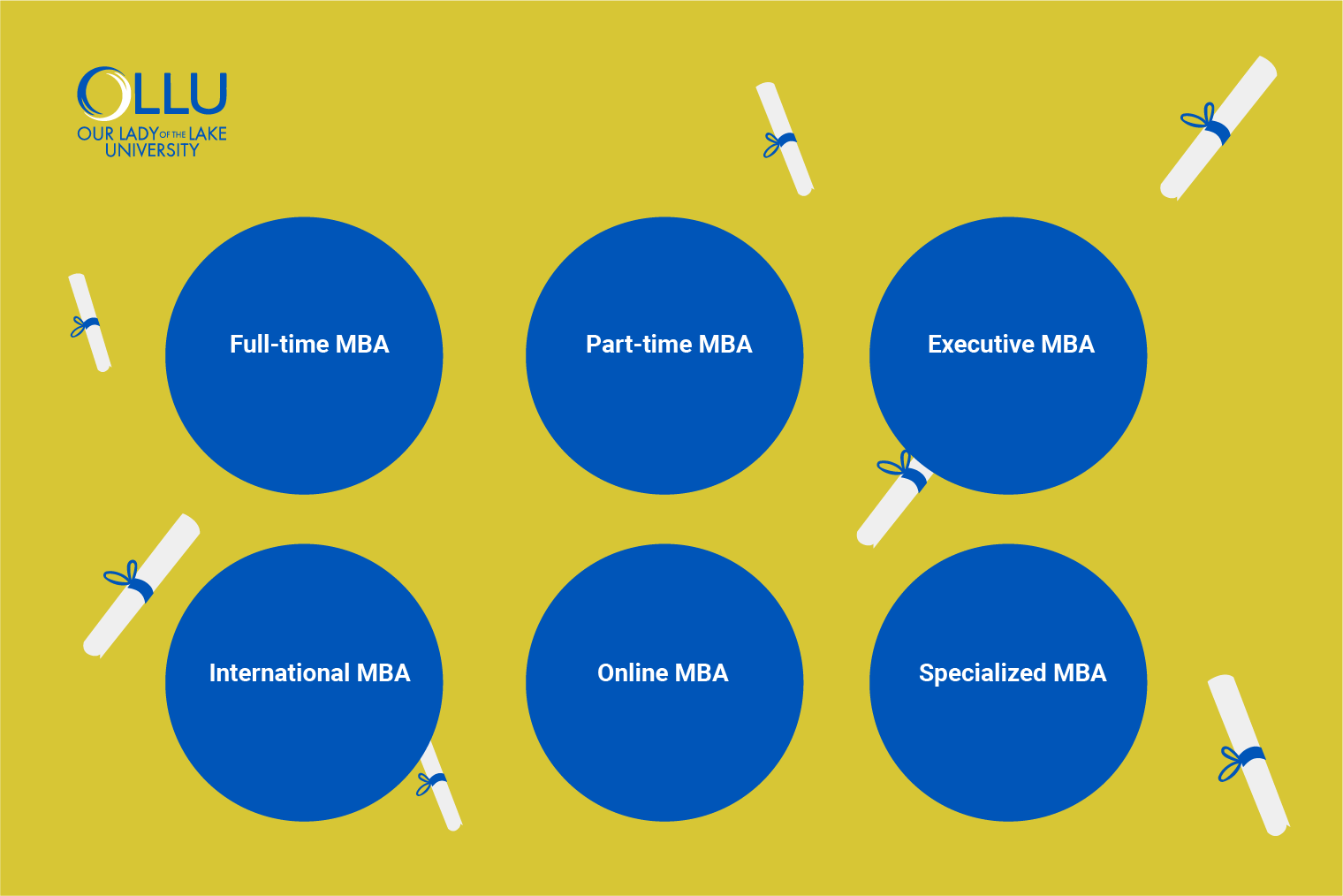What Is an MBA Degree? All You Need To Know
Oct 01, 2023

Taking the leap towards an advanced degree, especially after some time, can be a daunting prospect for many learners. Questions like “What is an MBA degree?” or “What do you learn in an MBA program?” might weigh on your mind. Well, you’re not alone, and these concerns shouldn’t hold you back. We have the answers. So, read on and learn more about what an MBA degree entails as we help you explore all available options.
What Is an MBA Degree?
MBA, as an acronym, stands for Master of Business Administration. This type of degree represents an advanced academic pursuit tailored for individuals seeking to explore the complexities of the business sphere.
MBA degrees are positioned at the graduate level because they typically go beyond the basics of leadership and administration by encompassing many business-related domains.
How Does an MBA Program Work?
An MBA works as a step forward from undergraduate degrees, like a bachelor’s, providing an excellent pathway if you are aiming to advance into administrative and managerial roles. These programs are designed with the primary goal of cultivating a deep understanding of organizational dynamics, focusing on both theoretical knowledge and practical application of business principles.
With comprehensive curriculums covering areas such as accounting, finance, marketing, and management, they are a pivotal asset for career progression and personal development.
MBA Program Types

Different types of MBA programs are customized to suit specific preferences and career objectives. Below, we go through some types based on the format and area of specialization.
Full-time MBA
Full-time MBA programs are more rigorous and usually last for two years, depending on the institution. If you choose to pursue this type of MBA program, be prepared for an intense schedule that includes many hours of classes, assignments, and the possibility of joining extracurricular activities.
While enrolled in a full-time MBA program, you must prioritize your studies and may have limited time for other commitments or employment. However, this immersive approach provides a chance to engage closely with the coursework, network, and apply business concepts practically.
Part-time MBA
Part-time MBA programs offer a more flexible approach to advanced business education. Such programs are ideal if you wish to continue working while pursuing your MBA. Typically extending over a longer duration, often two to five years, the part-time format allows you to attend classes in the evenings, on weekends, or through online platforms.
As a part-time MBA student, you have the flexibility to balance your academic pursuits with your professional commitments. This format allows you to apply the knowledge you gain in class directly to your current job, enhancing your studies and career simultaneously.
Despite having a less intensive schedule than a full-time program, you can still expect a consistent and manageable workload that accommodates your work-life priorities.
Executive MBA
If you’re an experienced professional with at least 5-10 years of work under your belt, an Executive MBA (EMBA) program may be the perfect fit for you. These programs are designed with your busy schedule in mind and often offer weekend or intensive sessions to accommodate your professional responsibilities. Therefore, although the workload is significant, the program is still designed to be manageable for working professionals.
International MBA
An International MBA (IMBA) focuses on global business perspectives and practices. Unlike traditional MBAs, this program type provides you with a comprehensive understanding of international markets, cross-cultural management, and the complexities of operating in a global business environment.
IMBAs include courses on international business strategies, global marketing, and cross-border negotiations. Additionally, they offer opportunities for international travel, study-abroad experiences, or immersion in diverse cultural and business settings.
Online MBA
If you want more flexibility, you should definitely consider getting your MBA degree online. As the name suggests, these programs conduct classes online, eliminating the need for extensive travel time and offering greater scheduling flexibility. This setup allows you to attend classes and engage with coursework right from the comfort of your own home.
Specialized MBA
Specialized MBAs are programs that focus on a specific industry or functional area within the field of business. Unlike general MBA programs that cover a wide range of business topics, specialized MBAs concentrate on a particular niche, providing in-depth knowledge and skills tailored to that sector. Some of the most popular specialized MBA options include:
- Healthcare MBA
- Finance MBA
- Marketing MBA
- Entrepreneurship MBA
- Supply Chain Management MBA
- Human Resources MBA
These MBA programs are designed to provide a targeted curriculum focusing on the specific skills and knowledge needed for success in a particular industry or function. They are especially valuable in earning a competitive advantage in job markets that demand expertise in a specialized area.
MBA Courses and Curriculum
A typical MBA program covers a broad range of courses to ensure a well-rounded understanding of business principles and management skills. The curriculum usually starts with foundational courses like Fundamentals of Business Administration, which introduces key financial, marketing, and operations concepts.
As you progress, the curriculum shifts toward more specialized subjects like Managerial Control Systems to teach you techniques for planning, monitoring, and improving organizational performance and Strategic Human Resources Management: Policies and Practices to explore effective HR strategies and policies for maximizing productivity and success.
MBA programs may also provide unique learning opportunities like an International Study Tour, enabling you to experience global business environments firsthand. Such a comprehensive curriculum guarantees your preparation with the knowledge and skills required to succeed in leadership positions across various industries and sectors.
MBA Degree Candidate Requirements
To pursue an MBA degree, you must meet specific requirements and criteria, which vary depending on the program and institution. It is best to check the prerequisites for each program you are interested in to ensure that you meet the criteria for admission.
Some common prerequisites that most MBA programs examine in applicants include:
- An undergraduate degree from a recognized university
- Standardized test scores
- Transcripts of your past education
- Recommendation letters from professors, employers, or other professional contacts
MBA Degree Cost
The cost of obtaining an MBA degree can vary greatly depending on the institution you choose to attend. Statistics reveal that the average tuition cost of an MBA degree is $71,880. However, tuition fees can range anywhere from $20,000 to over $100,000.
Scholarships, grants, and financial aid can offset some of these expenses. However, planning and budgeting carefully for your MBA journey is essential to ensure you can manage the financial commitment comfortably, including additional costs like textbooks, housing, transportation, and daily living expenses, as they can significantly increase the total amount spent.
How Long It Takes To Get an MBA
The time it takes to earn an MBA degree depends on your chosen program. For example, a full-time MBA program typically lasts for two years. In contrast, some other options, like accelerated and executive MBA programs, can reduce the duration of the program significantly by offering a more condensed curriculum that you may complete in as little as one year.
However, if you value flexibility over a shorter program, you can choose a part-time MBA, as the completion time for such programs can range from two to five years, depending on your schedule.
MBA Salary
Projections from the Graduate Management Admissions Council (GMAC) indicate that MBAs can anticipate a modest $10,000 bump in their starting salaries, totaling $125,000 for the year. This figure represents a significant increase, surpassing industry hires by $20,000 and outpacing candidates with a bachelor’s degree by a notable $50,000.
It’s important to note that these salary figures can vary based on several factors, including industry, geographic location, level of work experience, and other individual qualifications.
Why Should You Get an MBA Degree?
Acquiring an MBA degree can be an effective move toward enhancing professional growth. With an MBA, you not only broaden your knowledge base but also open doors to various job roles and industries, significantly increasing the number of positions you’re eligible for. Moreover, graduate degrees, such as master’s and doctorate, are often associated with a more swift career progression and an increased likelihood of promotion within your current organization.
The advanced skills and insights gained through an MBA program make you a valuable asset and a top contender for leadership positions. This, in turn, is often accompanied by higher earning potential, with MBA graduates commanding competitive salaries across various sectors.
What Can You Do With an MBA Degree?
An MBA degree opens many doors due to the versatile skills and knowledge it imparts. The expertise gained in areas like finance, marketing, operations, and strategic management is in demand across various sectors.
For example, if you choose to work for a corporation, you can help guide the company toward success through analytical thinking and strategic decision-making. Likewise, in government and public sectors, these skills are crucial for optimizing budgets, streamlining processes, and making data-driven choices for effective governance. Even non-profit organizations can benefit immensely from such specialized skills in enhancing organizational efficiency and driving strategic initiatives, ultimately extending the reach and impact of these entities.
An MBA can also help you attain the skills, knowledge, and mindset needed to start and grow a successful business. It provides a comprehensive foundation for entrepreneurship and connects you with mentors, investors, and potential partners.
The Bottom Line
An MBA is undeniably the key to unlocking success in today’s competitive business landscape. If you’re an adult learner with aspirations to advance your career, consider exploring our institution’s MBA program. Its comprehensive curriculum will help enhance your knowledge and sharpen practical skills, preparing you to navigate the complexities of leadership and decision-making. This could be the transformative step you need for a brighter future.
FAQ
Is getting an MBA hard?
Pursuing an MBA can be academically challenging, based on the program’s intensity. However, it is easily manageable with dedication and a strong work ethic.
Is getting an MBA worth it financially?
An MBA degree can result in high-paying jobs, but its financial value depends on individual career goals, industry, and location.
Can you get an MBA with any degree?
While some prefer business-related degrees or relevant work experience, most MBA programs accept students from different educational backgrounds.
What is the most difficult MBA specialization?
Specializing in MBA subjects like Finance, Quantitative Analysis, and Operations Management is considered more challenging due to their focus on quantitative skills, but perceived difficulty is subjective.
Which MBA specialization offers the highest earning potential?
Fields such as Finance, Consulting, and Information Technology Management usually yield higher earnings, but location, industry demand, and personal performance can also impact earning potential.
Is there anything higher than an MBA?
Yes, advanced degrees beyond an MBA exist, such as a DBA or specialized master’s degree.